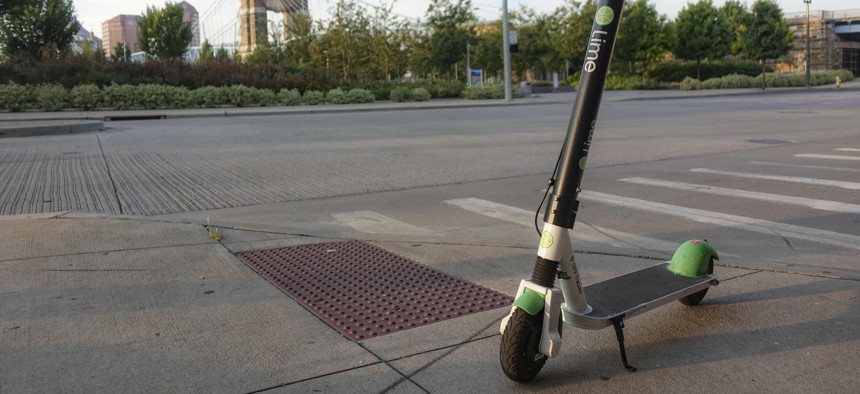Disability Advocates Sue Cities Over Scooters Blocking Sidewalks

A Lime electric rental scooter parked near a crosswalk awaits a user. AP Photo/John Minchillo
A new suit against Minneapolis and scooter companies is at least the third of its kind filed this year. It alleges that electric scooters are creating hazards on sidewalks for people with disabilities.
Dockless electric scooters are posing obstacles and hazards for disabled pedestrians in Minneapolis in a way that violates federal law, a disability rights advocate alleges in a lawsuit filed this week against the city and companies that rent the scooters.
At least two similar cases are pending in California. They come at a time when thousands of the rental scooters have proliferated on city streets around the U.S., with some people viewing them as a convenient transportation option and others deriding the vehicles as a public nuisance.
The Minneapolis lawsuit argues that the companies have effectively turned public rights of way “into their private retail stores, showrooms, highways, and storage facilities—in abject disregard for the safety and access rights of residents or visitors with disabilities.”
“Private scooter companies have been allowed to appropriate the public commons for their own profit, regardless of the impact on the City's residents,” the complaint adds.
Noah McCourt, who filed the lawsuit, has autism and a coordination disorder and says that he has regularly found himself dodging scooters that people are riding at high speeds. He also says he has repeatedly tripped over scooters left along streets and sidewalks.
McCourt’s complaint contends that the scooters are creating a situation where people with disabilities, including those in wheelchairs, or who are blind, are being denied their right to travel freely and safely on public walkways—a violation of the federal Americans with Disabilities Act. The lawsuit also claims that the city is running afoul of a related federal law known as the Rehabilitation Act.
Sidewalks, crosswalks and other pathways, the lawsuit says, are “no longer readily accessible to and usable by persons with mobility and/or visual disabilities due to the pervasive, unregulated, and ever-growing presence of Scooters that create physical access barriers.”
The lawsuit was filed in federal district court in Minneapolis. It names Neutron Holdings, Inc., which rents Lime Scooters, as well as Bird Rides, Inc., which rents Bird scooters as defendants.
Minneapolis is also included as a defendant, with the suit saying that the city is falling short of its obligations to maintain accessible streets and sidewalks under the ADA. A spokesperson for the mayor’s office didn’t immediately respond to a request for comment on Friday.
Lime declined to comment on the litigation itself. But a Lime spokesperson said by email that the company is “committed to finding a solution that works for everyone.”
“The onus is on us to innovate and educate,” they added. “That’s why we’ve engaged disability advocates and continue to educate riders and the community about proper riding and parking etiquette to ensure scooters are parked in an orderly, respectful way.”
McCourt is an advocate on mental health and disability rights issues and serves on the Minnesota Governor's Council on Developmental Disabilities.
In February, a group of southern California residents with disabilities lodged a lawsuit in federal court against Bird and Lime and seven cities in the region, including Long Beach, alleging ADA violations like those outlined in the Minneapolis case. A separate, similar suit filed in January is pending against the companies, as well as scooter rental company Razor USA, and the city of San Diego.
Bill Lucia is a Senior Reporter for Route Fifty and is based in Olympia, Washington.
NEXT STORY: The 50 Finalists of Route Fifty's 2019 Navigator Awards






